[Movie Review] Seoul Vibe takes a joy ride through late-80s urban fashion
by Dramaddictally
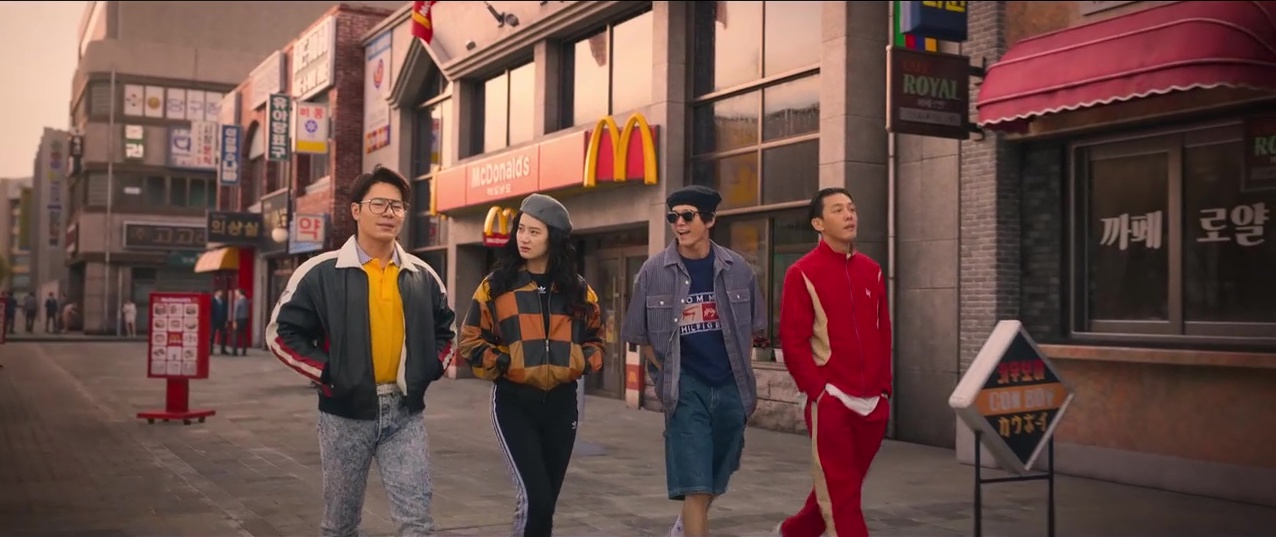
Netflix’s Seoul Vibe is a comedic action movie that pits political corruption in 1988 South Korea against the indifference and bravado of a group of young drivers. It’s an ode to the classics with retro retail scattered throughout, from cars and camcorders to kicks and Kangols.
MOVIE REVIEW
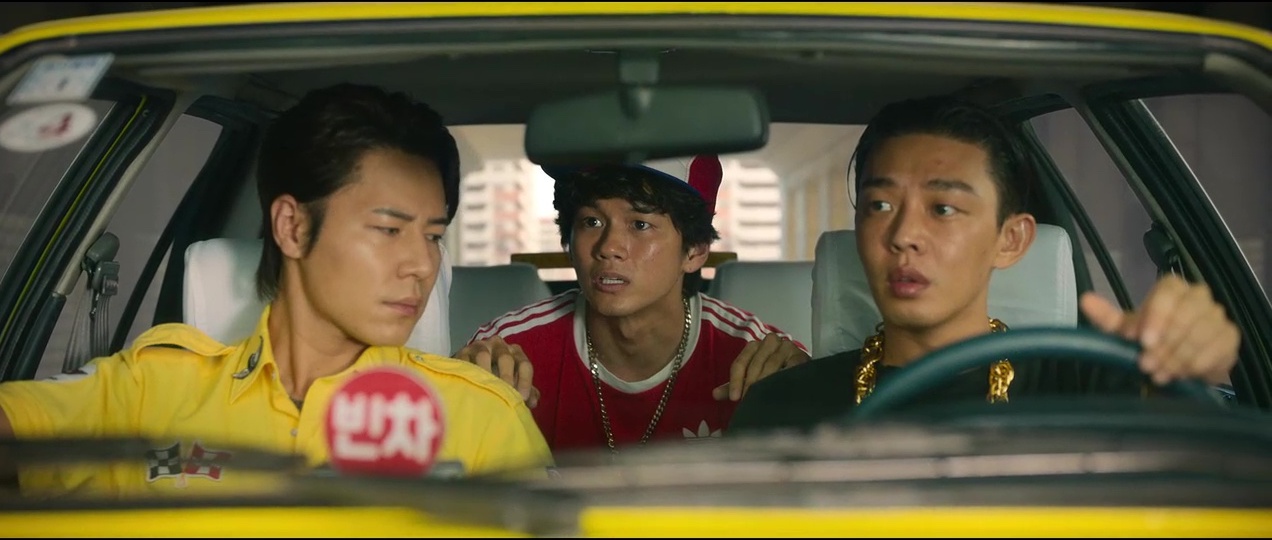
If you’ve seen any of The Fast and the Furious franchise (which, admittedly, I haven’t) you’ll likely be in familiar terrain. Seoul Vibe has the same summer blockbuster feel with a band of badass twentysomethings who dedicate most of their dialogue to talking trash. While the choice of drivers as main characters would hint at street racing and car chase sequences, these are only marginal to the overarching plot, which takes us into James Bond territory, cribbing its cues from spy and heist movies.
The story opens with DONG-WOOK (Yoo Ah-in) and JOON-GI (Ong Seong-wu) returning to Korea after a stretch working as drivers in Saudi Arabia. They’re happy to report to their taxi-driving friend BOK-NAM (Lee Kyu-hyung) that they’ve brought with them the money to get on with their goals. Their dream is to go to the US, where Dong-wook’s mother already lives.
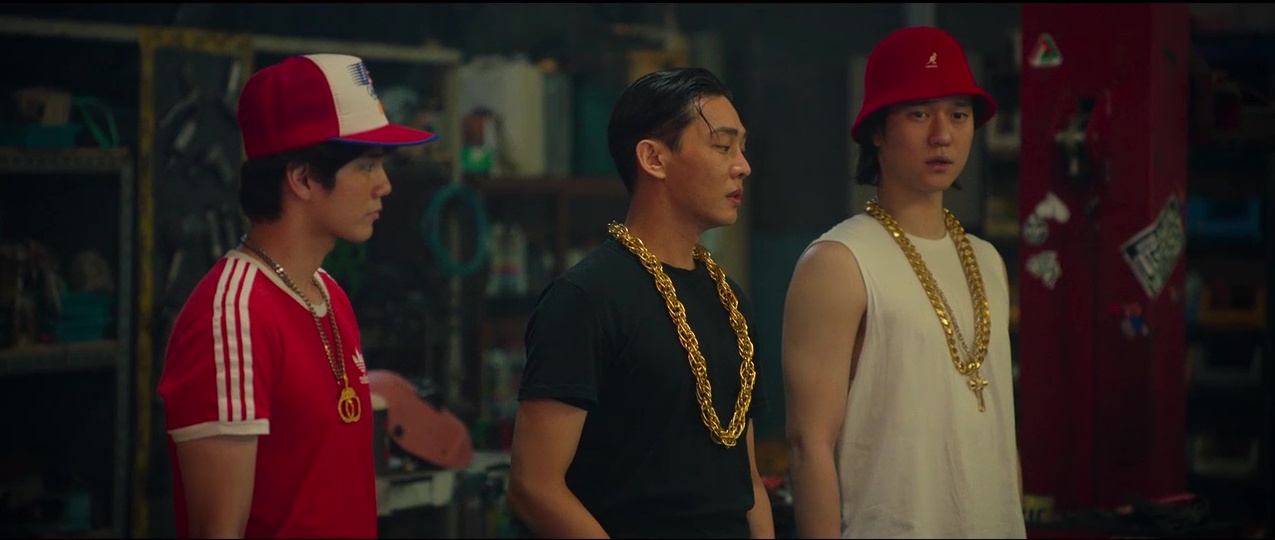
Back in their home city of Seoul, the three friends go to their old clubhouse — part mechanic’s garage, part DJ booth, all 80s American paraphernalia. There they meet up with Dong-wook’s sister, YOON-HEE (Park Joo-hyun), who heads a biker gang, and their record-spinning friend WOO-SAM (Go Kyung-pyo), also known as DJ John Woo on his mixtapes.
By this point we’re knee-deep in nostalgia with costuming detailed to emulate late-80s hip-hop videos (if you’ve never seen LL Cool J’s “I’m Bad,” now would be your time to watch it and compare). Throughout, we’ll be awash in Adidas tracksuits, fat gold chains, laceless Shell Toes, oversized glasses, and the ubiquitous Kangol hat. Add to this a few boomboxes, some coveted Jordans, and an Eric B. and Rakim record and you get the vibe of Seoul Vibe.
Before the friends can catch up too much, PROSECUTOR AHN (Oh Jung-se) arrives. He lists a litany of their illegal activities. Dong-wook and Joon-gi brought a large sum of money into the country without declaring it. Bok-nam’s taxi is unlicensed. Yoon-hee’s bike has illicit customization. And Woo-sam, well — it’s a crime to break hearts. Unless this team of not-so-motley misfits wants to be arrested right now, the prosecutor needs them to go undercover as drivers in an investigation against the former dictator. If they succeed, he’ll wipe their criminal records clean. The always brazen Dong-wook speaks up: they’ll do it if Prosecutor Ahn can get them their US visas. And there the stakes are set.
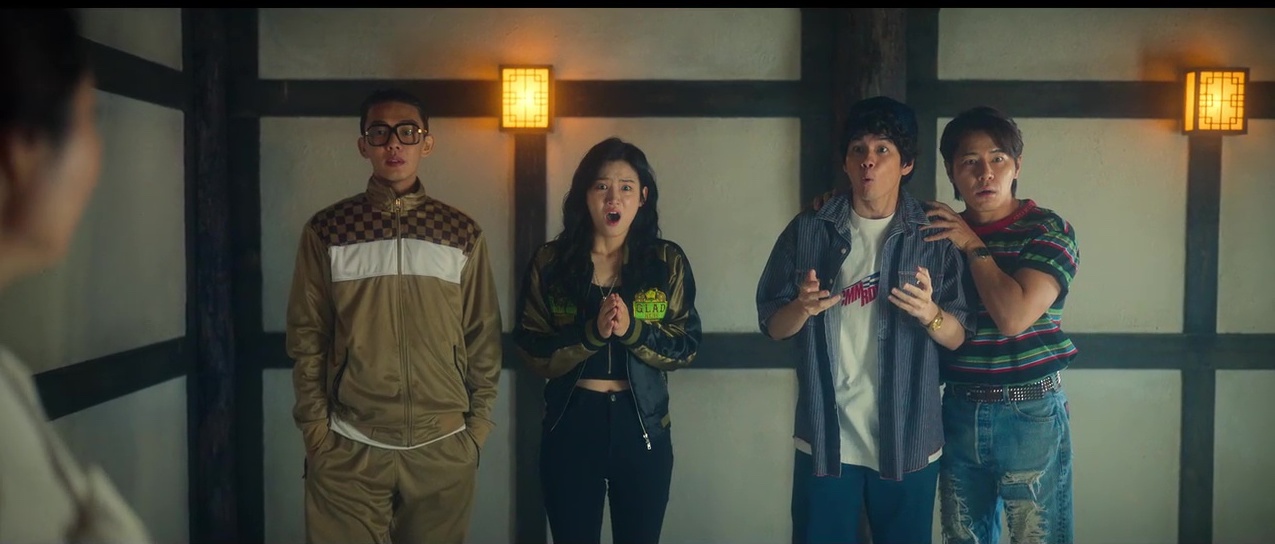
The setup — which drags out more than half of a film that’s over two hours — is this: the ex-dictator (“The General”) embezzled some public funds while in power. He now wants to launder that money. PRESIDENT KANG (Moon Sori) is a loan shark and leader of the underground economy hired by The General to get this task accomplished. Her plan is to deliver the money in ten rounds to various locations (it’s currently held in a vault inside a temple — nothing like movie magic to see all those funds in cash). She needs drivers to make the deliveries and she’ll pay 10 million won for each successful transfer (which Dong-wook negotiates up, of course).
In a tryout run against other drivers — where Dong-wook tears up the streets, stalls, and sidewalks of Seoul to the tune of Run DMC’s “You Be Illin’” — the crew wins the job. They are now positioned to gain information about President Kang so that the prosecutor’s office can take action against her (I was left a little puzzled about how they were planning to link the evidence to the former dictator, and the film’s wrap-up doesn’t really address it).
The second act lags as the team makes mostly uneventful deliveries, basks in their newfound wealth, and appears entirely disconnected from the political realities they’re taking part in. All of this feels like a continuation of the setup so the moviemakers can get to the part that seems to interest them most in the film’s final third.
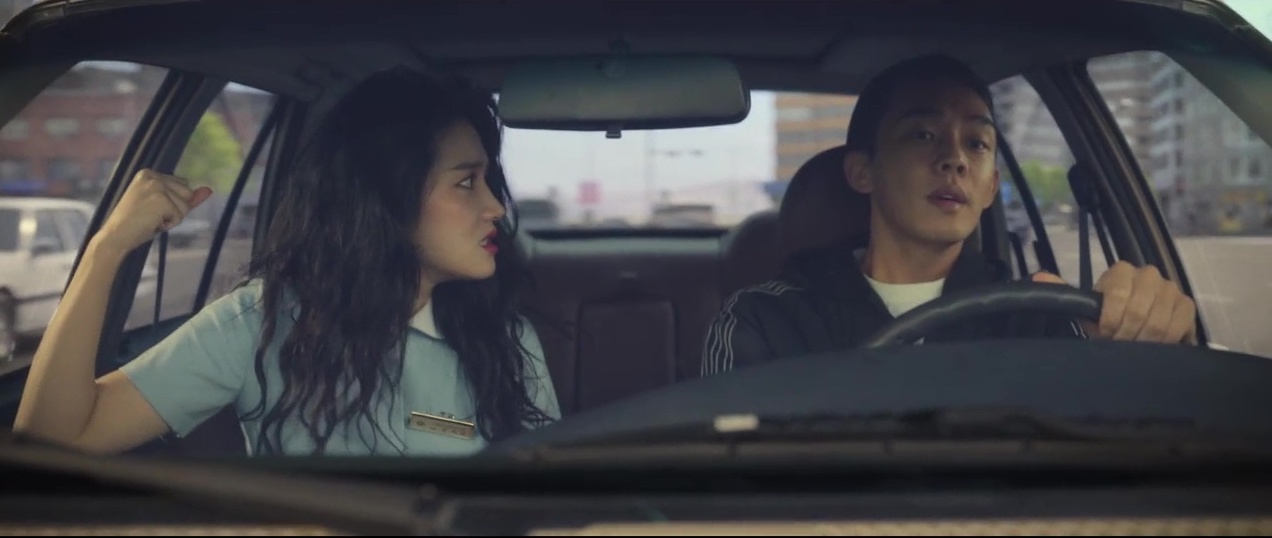
As is necessary with an ensemble cast, we arrive at discord among the group when the situation gets dangerous. DIRECTOR LEE (Kim Sung-kyun), an employee of President Kang, is a sadist who terrifies the team by running them off the road and pointing guns at their heads (and I can’t help but picture this actor as the goofball husband in Reply 1988, set in the same year as this movie, but on such a different wavelength).
After this, Dong-wook wants out of the prosecutor’s investigation but his friends want to continue, getting deeper into their spy activities by going undercover at a hotel to obtain President Kang’s accounting books (which of course brings Dong-wook back around). In the interim, Woo-sam lives up to his heartbreaker status by playing the role of the homme fatale, sleeping with President Kang’s secretary to get them the key to get in.
What starts with vibrant colors and adolescent dreams suddenly has a serious tonal shift, turning dark with murder, torture, and mutilation. While I found this change tough to swallow, it’s even harder to shift gears and reverse when the film goes right back to upbeat music and comedic antics after these events. The darker scenes serve to get us to the final showdown between the scrappy drivers and the high-level criminals, bringing the protagonists personally into the situation. And though that purpose may be fulfilled for the story’s sake, it feels meaningless when the characters remain unchanged, maintaining their apathy and moving on to the next joke.
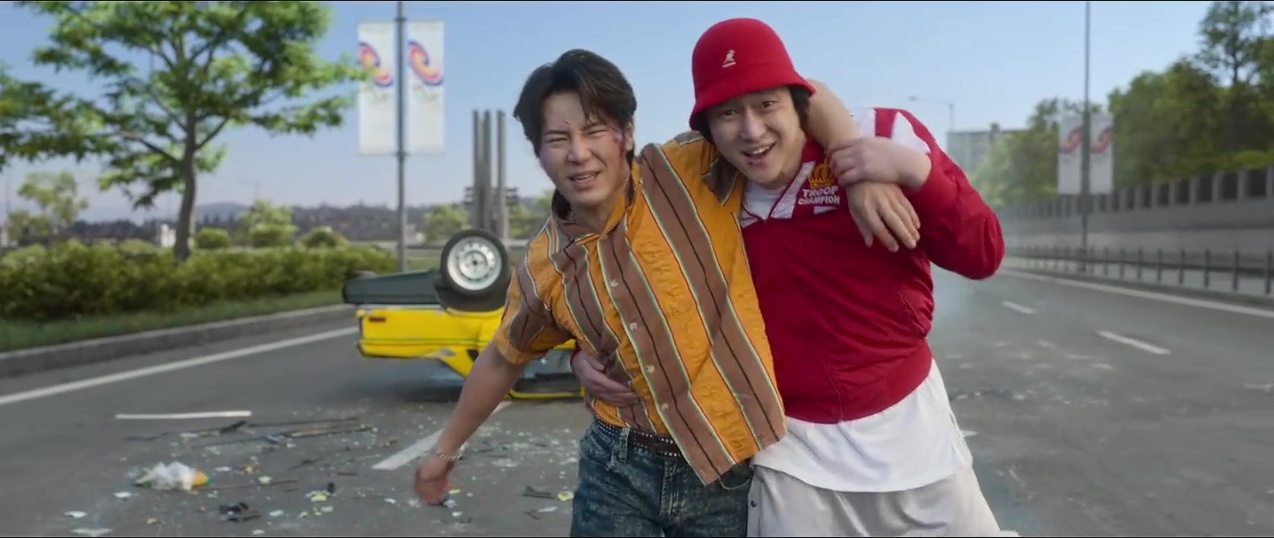
If you came for the cars, they’re stacked up in the film’s conclusion. From the beginning, we’re told that the Olympics are just around the corner (hosted in Seoul in 1988) and the final scenes feature road races, gun fights, explosions, and more gun fights — this time on a plane — all in front of an international audience amidst the Olympic games. Relying on closeups of tires spinning and feet pressing into gas pedals, its somewhat of an old-school chase. And in an action flick that adheres to the moves of its genre, I don’t have to tell you who wins or how things resolve.
Seoul Vibe offers a mostly lighthearted foray into the past through a contemporary lens that speaks more to the desire for nostalgia than for historical reality. The retro quality comes through costume, color, and music, but the clothes often feel like playing dress up, disconnected from the story. The music, present in the beginning, disappears mid-way through. And the bright outdoor colors are paired with florescent indoor lighting that certainly feels dated, but overshoots the upbeat 80s and lands somewhere in disco.
While all this tries to convince us that this is fun fare, what’s actually happening on the screen says otherwise. The film is cavalier in its treatment of the political context but even if we discount that, we’re left with a set of one-dimensional characters who remain unaffected while people around them die. The film wants to take us for a fun-filled spin but it’s so indifferent to its subject matter that I can’t jump in for the ride.
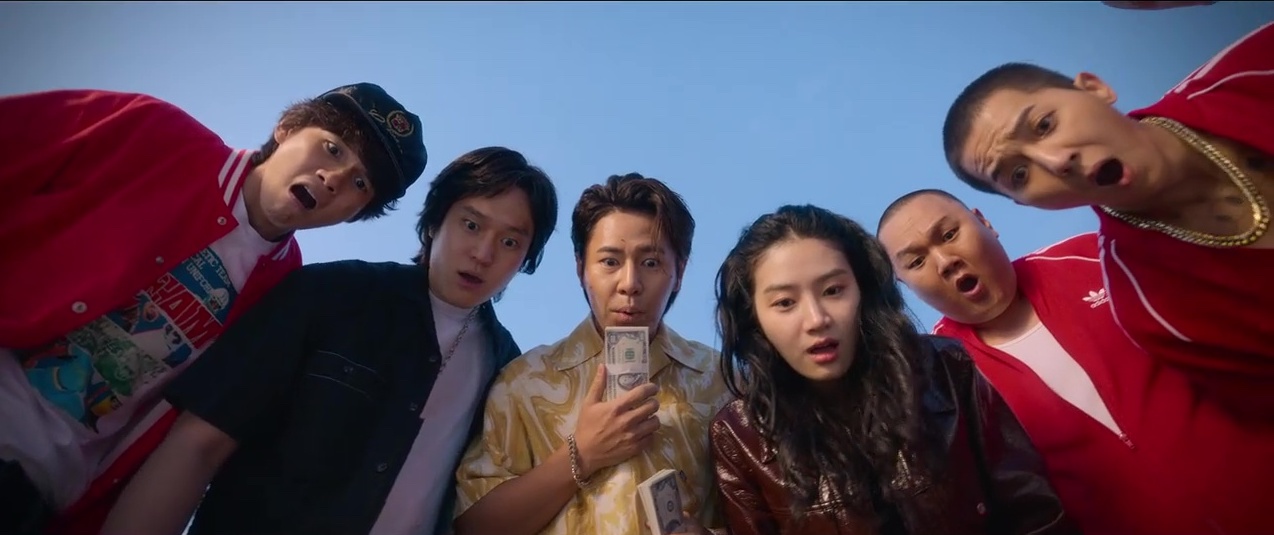
RELATED POSTS
[Movie Review] Seoul Vibe takes a joy ride through late-80s urban fashion
Source: Buzz Pinay Daily
0 Comments